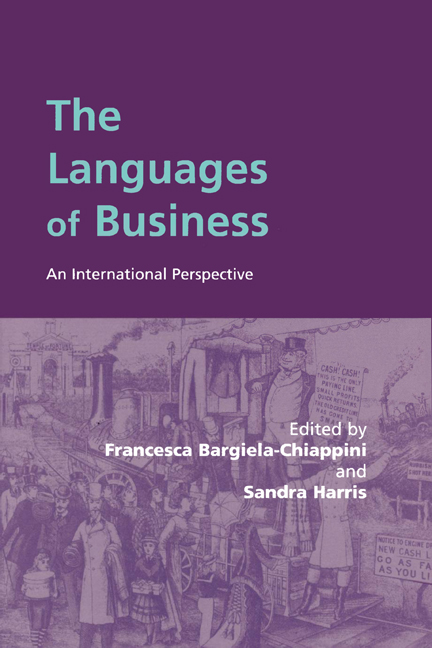Book contents
- Frontmatter
- Contents
- Chapter 1 The languages of business: Introduction and overview
- SECTION 1 INTER-CULTURAL DISCOURSES
- Chapter 2 Spoken discourse in the multicultural workplace in Hong Kong: Applying a model of discourse as ‘impression management’
- Chapter 3 Australian-Japanese business interaction: Some features of language and cultural contact
- Chapter 4 Requests in German-Norwegian business discourse: Difference in directness
- Chapter 5 The Asian connection: Business requests and acknowledgements
- SECTION 2 CROSS-CULTURAL DISCOURSES
- Chapter 6 Organisation in American and Japanese meetings: Task versus relationship
- Chapter 7 Bookshop service encounters in English and Italian: Notes on the achievement of information and advice
- Chapter 8 Joking as a strategy in Spanish and Danish negotiations
- Chapter 9 Lexical landscaping in business meetings
- SECTION 3 CORPORATE DISCOURSES
- Chapter 10 Languages within languages: A social constructionist perspective on multiple managerial discourses
- Notes
- References
- Notes on contributors
- Index
Chapter 7 - Bookshop service encounters in English and Italian: Notes on the achievement of information and advice
Published online by Cambridge University Press: 24 September 2020
- Frontmatter
- Contents
- Chapter 1 The languages of business: Introduction and overview
- SECTION 1 INTER-CULTURAL DISCOURSES
- Chapter 2 Spoken discourse in the multicultural workplace in Hong Kong: Applying a model of discourse as ‘impression management’
- Chapter 3 Australian-Japanese business interaction: Some features of language and cultural contact
- Chapter 4 Requests in German-Norwegian business discourse: Difference in directness
- Chapter 5 The Asian connection: Business requests and acknowledgements
- SECTION 2 CROSS-CULTURAL DISCOURSES
- Chapter 6 Organisation in American and Japanese meetings: Task versus relationship
- Chapter 7 Bookshop service encounters in English and Italian: Notes on the achievement of information and advice
- Chapter 8 Joking as a strategy in Spanish and Danish negotiations
- Chapter 9 Lexical landscaping in business meetings
- SECTION 3 CORPORATE DISCOURSES
- Chapter 10 Languages within languages: A social constructionist perspective on multiple managerial discourses
- Notes
- References
- Notes on contributors
- Index
Summary
INTRODUCTION
In her analysis of service encounters in England and in the Neapolitan region of Italy, George (1990) observes that English speakers, even those who are very competent in the Italian language, often find it hard to manage negotiations and carry out profitable conversations in Neapolitan shops or service-places, such as ticket-offices and reception desks. On the basis of similar observations, Gumperz (1992) discusses the notion of ‘minorization’ to describe situations where some culture-specific inference provokes misunderstanding and impedes communication. In his words, ‘minorization’ is particularly applicable to
situations where one participant is bilingual or bidialectal and his/ her talk is interpreted in terms of the other participant's culturally specific inferential practices, and where the differences in interpretive criteria has a pejorative effect on the outcome of the interaction. (Gumperz 1992: 302)
Both George and Gumperz underline the fact that when different culturespecific inferences are applied to a given communicative situation, there is a risk that communication will be hindered, even when problems at the level of propositional content are absent. Gumperz suggests that the comparative analysis of speech behaviour in different communities helps cast light on what determines such different inferences, and the consequent interactional failure.
In this chapter I analyse talk produced in bookshop service encounters in England and Italy, with the aim of determining those features which may contribute to make it rather a different event in the two cultures. According to Drew and Heritage, service encounters can be considered ‘institutional interaction’ in so far as this is ‘primarily accomplished through the exchange between professionals and lay persons […], and participants’ institutional or professional identities are somehow made relevant to the work activities in which they are engaged’ (1992: 3-4). Here, I analyse the way English and Italian participants organise their conversation in order to make their institutional or professional identity relevant in talk.
While there are obviously many senses in which the sociocultural macro-context affects talk that is produced in a given situation, and speakers produce it according to their past experience and their knowledge of what such situations are (see Fairclough 1985; Kress 1985), there is also a sense, mainly advocated in the Conversation Analysis approach, in which talk contributes to creating the social situation and the experience of social situations.
- Type
- Chapter
- Information
- The Languages of BusinessAn International Perspective, pp. 136 - 158Publisher: Edinburgh University PressPrint publication year: 2020



